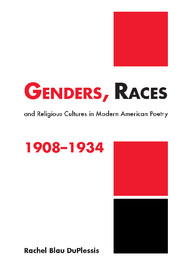Book contents
- Frontmatter
- Contents
- Acknowledgments
- 1 Entitled new: a social philology of modern American poetry
- 2 “Corpses of poesy”: modern poets consider some gender ideologies of lyric
- 3 “Seismic orgasm”: sexual intercourse, its modern representations and politics
- 4 “HOO, HOO, HOO”: some episodes in the construction of modern male whiteness
- 5 “Darken your speech”: racialized cultural work in black and white poets
- 6 “Wondering Jews”: melting-pots and mongrel thoughts
- Notes
- Works Cited
- Index
5 - “Darken your speech”: racialized cultural work in black and white poets
Published online by Cambridge University Press: 05 October 2009
- Frontmatter
- Contents
- Acknowledgments
- 1 Entitled new: a social philology of modern American poetry
- 2 “Corpses of poesy”: modern poets consider some gender ideologies of lyric
- 3 “Seismic orgasm”: sexual intercourse, its modern representations and politics
- 4 “HOO, HOO, HOO”: some episodes in the construction of modern male whiteness
- 5 “Darken your speech”: racialized cultural work in black and white poets
- 6 “Wondering Jews”: melting-pots and mongrel thoughts
- Notes
- Works Cited
- Index
Summary
Use dusky words and dusky images.
Darken your speech.
Wallace Stevens (1923)Caroling Dusk
Countee Cullen (1927)In the teens and twenties of the twentieth century, New Negroes and some politically sympathetic Euro-Americans struggled to counter the staggering oppressions of blacks in the post-Reconstruction United States – “economic disinheritance,” rigid educational and professional limits, murderous terrorism, imposition of segregation, and the compromise of African-American citizenship (C. Johnson 1954, 207). Tales of Darkest America, Fenton Johnson's blistering prose title from 1920, puns precisely on the site of the uncivilized and primitive, given the ethical and political scandals resisting racial equality. African-Americans claimed cultural authority in the Negro Renaissance. The New Black subjectivity was a culmination of cultural and political struggles of respect for blackness, desire for social striving and affirmation, self-determination, debates about the uses to which African-American “folkstuff” (Sterling Brown's term) could be put, and self-conscious focus on the decolonization of a serf population interior to the United States by an emergent educated elite (Brown 1996, 190).
Work by African-American poets had a mix of cultural and political tasks. For example, allusions to the strains of decolonization and the question of the “maturity” of a people occur in Langston Hughes' often-anthologized poem “I, Too, Sing America” (1925) whose simple diction and declarations seem superficially to concede the childishness of the “darker brother” even as the poem remarks how this brother grows strong (Hughes 1994, 46).
- Type
- Chapter
- Information
- Publisher: Cambridge University PressPrint publication year: 2001



